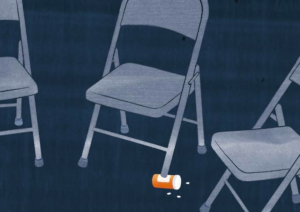From The New Republic: “Health authorities and medical researchers widely consider medication-assisted treatment (MAT) with methadone or Suboxone the most effective way of treating opioid addiction, which in 2016 affected some two million people across the United States. Yet in the midst of a national opioid epidemic, only a fraction of addicts receives MAT. In response, President Donald Trump recently vowed to expand access to MAT, which can be expensive and difficult for patients to obtain. The push, sorely needed as it may be, faces an obstacle that is beyond the abilities of the federal government to remedy. The real barrier may not lie in a lack of resources, but in the very way America still thinks of addiction, thanks to a decades-old 12 Step philosophy that has left a new generation of addicts out in the cold.”
-
There are major problems with this article. Twelve Step approaches to addiction AND Medically Assisted Treatment (MAT) are flip sides of the same “Addiction is a Disease” coin. BOTH are flawed approaches which promote confusion and ultimately undermine (for many people) their attempts to obtain a life free from addiction.
Yes, AA and NA has helped some people, but no where near the exaggerated claims trumpeted by Twelve Step zealots. Attempts by some people to conform to their Disease Based Model (the “One and Only Road”) has harmed their efforts to become drug free, and caused many people to become pessimistic about the possibility of permanent abstinence.
Medically Assisted Treatment – MAT, is the new EUPHEMISTIC name for “Opiate Replacement Therapy.” This new name is now calling synthetic opiates a form of “medicine” treating the “disease” of addiction. And they more often encourage people to stay permanently on these mind altering drugs for life.
Yes, methadone and suboxone have a positive role to play in helping to stabilize people addicted to opiates. And yes, these synthetic opiates have a positive role to play in helping people detox and/or slowly taper from their opiate addiction. But these MAT programs are often profitable enterprises that encourage and promote “maintenance” rather than a goal of abstinence. They promote another version of the “disease” concept of addiction that is merely the flip side of the same coin promoted by Twelve Step AA and NA programs.
See my link below to a blog I wrote a few years ago on the suboxone and methadone MAT programs.
And also see another link to a past blog of mine critically analyzing Twelve Step programs.Richard
-
Its like the choice between democrat or republican. Both incredibly flawed.
-
I wouldn’t make a major thing out of AAs so called “Disease” description. AA does not recommend “medication” as treatment and people that attend the AA should be attending of their own free will.
-
-
-
-
-
“At parties, David and Michael would nose around in cabinets overflowing with Xanax, Valium, Klonopin, and Benzos of all shapes and sizes. They would take out the powder, snort it, and fill the empty pill cases with sugar.”
Xanax, Valium, Klonopin do not come in capsules. Neither does oxy or roxy codone or Dilaudid or percocet … or anything a medicine cabinet bandit would look for.
This author knows so little about the subject of drugs and addiction he or she should just stay out of the discussion instead of wasting our time and making stuff up.
-
Speaking as someone who is 8 years off of all opiates, who has been on both Methadone and Suboxone in the past, and who spent many years in AA, the main issues I experienced with each are:
– AA views addiction as a brain disease, and commonly denies the idea of it involving the self-soothing of pain (especially trauma) in ways that were either learned, or discovered by default.
People may say it at times, but there is a tremendous, unspoken, collective “shaming” that goes on of anyone who speaks too much of trauma, harms, and childhood…this is seen as either self-pity, or “inappropriate” other than in a private conversation with a sponsor (especially if you utter the word incest).-Way, way, WAAAY too many people are placed on drugs like Suboxone (which by the way are entirely possible to abuse), because it is easy, appealing to the addicted person, less time- and money-intensive than a detox. (and doesn’t require inpatient), and because it is a profitable (customers for life!) industry. It’s one thing to use it for someone with a years-long heroin habit, who has tried other ways to get clean but could not, but quite another when it’s given as a first-choice solution for countless teens and young adults, and people with shorter-term abuse histories.
They are not generally presented as step-downs, but as permanent, lifelong solutions.
And similar to psychiatric drugs, the taper off of Suboxone is challenging because available dosages make it hard. The desire is for lifelong customers.-
Ingrid
Great points filled with much wisdom. Unfortunately, there is a growing uncritical acceptance of psychiatric drugs in Twelve Step programs. This system we live under does not, and cannot, provide any real solutions to drug addiction, a Revolution is required.
Richard
-
Ah, you beat me to it—wanted to tell you how much I appreciated your comments! Incredibly validating, thank you.
Yes, although there is a marginalization in AA of folk with “too much” of a “psychiatric thing” going on, general use of meds. like antidepressants is accepted as medicine. Perhaps the only psychiatric drug I saw questioned were benzodiazepines, since many have known them to be highly addictive.
I left AA for several reasons, but it was during a time where I began (still in it) my years-long detox. off psychiatric medications. There was no one there who even remotely understood how I got on them, how sane I really was, how excruciatingly difficult they are to come off…AND, how the detox. revealed deep layers of trauma and grief that made me appear somehow “unsober” to them
(vs. none of you are able to nonjudgmentally support me, none of you have met your own deeper wounds).
-
-
-
And not for anything, but since this is Mad in America…people who experience things that get called “mental illness” and land them in the psychiatric system (other than directly related to intoxication/withdrawal from drugs and alcohol) are heavily marginalized in places like AA.
-
I think a lot of people need drugs. I don’t mean because they’re “weaklings” or whatever, just…human have always done drugs, and now there’s this ridiculous situation in which a lot of the better drugs are illegal and/or heavily restricted, stigmatized, etc.
Back when I was involved in substance use, it was more immaturity and curiosity than anything else. I got labeled and destroyed by Mental Health, Inc. “Nothing personal.” I was just some middle class loser with good insurance. Happens.
My -personal- opinion, as someon who’s seen many parts of Mental Health, Inc. (when I think of Mental Health, Inc., I often think of that Roman deity…Janus…), is that -all- drugs should be legalized. I know…that’s Szasz…but I think all drugs should be legalized and then at least somewhat regulated, plus taxed a bit. I’m not anti-gov’t regulation as Szasz is, but I am anti-misery. Because I’m anti-misery, I find that I’m against “The War on Drugs” and against a lot of what the mental health industry is forcing on people.
If the prescription system could be largely scrapped, desirable drugs could be obtained w/ low costs…then I think a whole lot of misery–from the drugs, drug culture, and Mental Health, Inc.–could be avoided. Of course..if one could purchase uppers, downers, and pain killers at reasonable costs from a local pharmacy, then I imagine pain management and psychiatry would both cease to exist, because direct access would end the need for an MD/DO middle man. I doubt that will ever happen, but…it certainly would be a rational, humane, and potentially lucrative (for the gov’t coffers…) approach.
-
I have only read two of your many comments Yeah I Survived and I so so agree witg you.
The DSM is strictly a guideline for doctors fresh out of university it is not a guideline to life and all the adversity we face from the day we are born and sometimes before.
I think people are so resilient hence Yes We Survive. I think people can become on the edge and for whatever reason attempt their life. I don’t think you have to have a predisposition to do this. I think you have to have a predisposition to hear voices, psychosis, mania, delusions and paranoia.
I think there are are no tests and I think the doctor William J Walsh PhD has found such a test.
Yes I think they should legalise social drugs most definitely.















